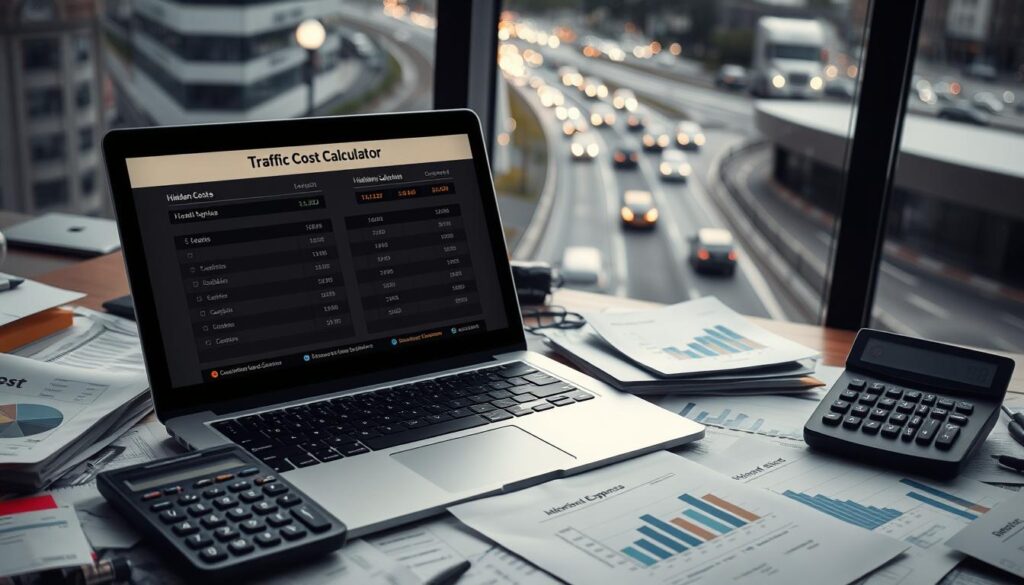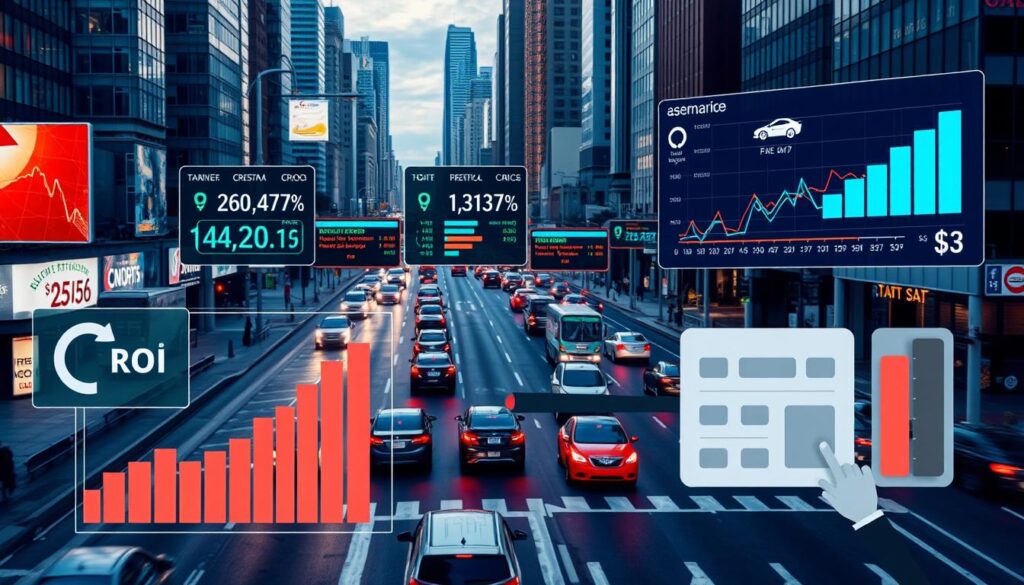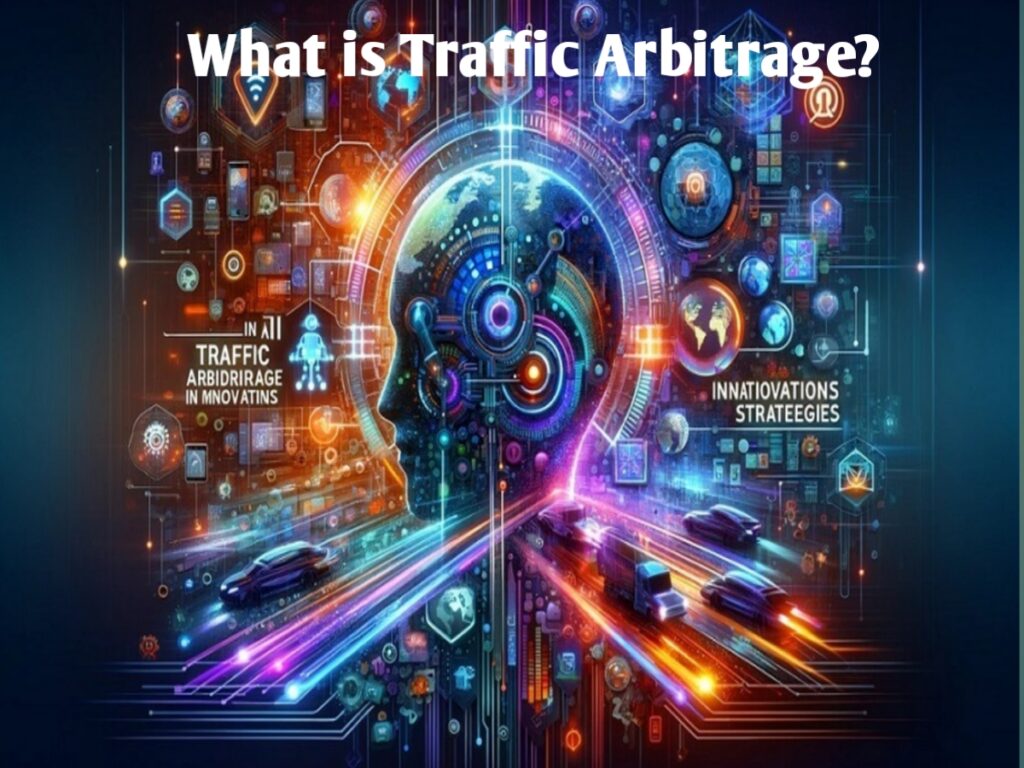In the fast-paced world of digital marketing, knowing the real traffic cost of your web traffic is key to success. As an entrepreneur or marketing pro, you know how vital it is to bring visitors to your site. But have you thought about the hidden costs of those visitors? Figuring this out could help you get more from your marketing budget.
Meet the traffic cost calculator, a tool that reveals the true cost of your web traffic. It helps you understand the factors that affect these costs. This way, you can make smarter choices about your marketing and use your budget more effectively.

Key Takeaways
- Discover the hidden costs of your web traffic and their impact on your bottom line.
- Learn how to calculate your cost per acquisition and factor in additional expenses.
- Explore strategies to optimize your traffic costs and maximize your ROI.
- Understand the importance of traffic cost as a crucial metric for online success.
- Gain the knowledge to make more informed decisions about your marketing budget and investment.
Understanding the True Cost of Your Web Traffic
Dealing with web traffic can be tough for businesses. There are many things that affect how much it costs to get people to your site. Knowing these traffic cost factors is key to making your online business successful and profitable.
Table of Contents
Factors Influencing Traffic Costs
Several things can change how much web traffic costs, including:
- Advertising platform fees: The fees for ads on sites like Google, Facebook, or LinkedIn can really add up.
- Ad creative costs: Creating ads that grab people’s attention can cost a lot, but it’s worth it.
- Landing page optimization: Making sure your landing pages work well can lower the cost of getting visitors.
- Conversion rates: How many visitors do something you want them to, like buy something, affects your costs.
Why Traffic Costs Matter for Your Business
It’s important to know why traffic costs matter for your online business. By keeping an eye on and improving your traffic costs, you can:
- Improve your return on investment (ROI): Knowing your traffic costs helps you spend your marketing budget wisely.
- Enhance your profitability: Cutting down on expensive traffic sources can save you money and increase your profits.
- Make data-driven decisions: Looking at your traffic cost data can give you insights to improve your marketing.
Learning to manage your web traffic costs is crucial for your business’s success online. By staying informed and proactive, you can handle the challenges of traffic costs. This way, your marketing efforts will bring lasting value to your business.

Exploring Different Traffic Sources and Their Costs
You have many ways to get people to visit your website. Each method has its own costs and benefits. Knowing these can help you use your marketing budget wisely.
Paid Advertising
Paid ads, like search engine marketing and social media ads, can bring targeted visitors. But, they cost money per click or impression. It’s key to check if your ads are worth the cost.
Organic Search
Getting found through search engines is often the cheapest way. There’s no direct cost, but SEO can improve your site’s visibility. This can bring more visitors over time.
Social Media
Social media can draw new visitors. Some activities are free, but paid ads can reach more people. This can help you target specific groups.
Referral Traffic
Referrals from other sites can be valuable. Building relationships and guest posting can get you more visitors. This can be cheaper than paid ads.
When looking at costs, think about both upfront and long-term benefits. Each source has its own unique advantages. By understanding these, you can make smart choices for your marketing.
| Traffic Source | Typical Costs | Potential Benefits |
|---|---|---|
| Paid Advertising | CPC, CPM | Targeted, immediate results |
| Organic Search | SEO investment | Cost-effective, long-term visibility |
| Social Media | Paid ads, content creation | Engagement, brand awareness |
| Referral Traffic | Relationship building, guest posting | Diversified traffic sources |

Finding the right mix of traffic sources depends on your goals and budget. By comparing costs, you can create a strategy that’s both effective and affordable.
Traffic Cost Calculator: Unveiling the Hidden Expenses
As a business owner, knowing the real cost of website traffic is key. The initial ad spend or marketing efforts might seem clear. But, hidden expenses can cut into your profits. That’s where a traffic cost calculator is useful.
Calculating Your Cost per Acquisition
The cost per acquisition (CPA) shows the real cost of turning a visitor into a customer. To figure out your CPA, consider these factors:
- Advertising costs (e.g., pay-per-click ads, social media ads)
- Content creation and promotion expenses
- Website maintenance and optimization costs
- Customer acquisition and retention efforts
By using a traffic cost calculator, you can see the real cost of getting each new customer.
Factoring in Additional Expenses
There are other costs besides direct traffic expenses. These include:
- Landing page optimization – Making sure your landing pages work well can boost your ROI.
- Conversion rate optimization – Improving your website’s conversion paths can increase the value of each visitor.
- Analytics and reporting – Good analytics tools give insights for better traffic strategies.
By adding these extra costs, you understand your web traffic’s true cost better. This helps you make smarter marketing budget and strategy choices.

A traffic cost calculator is a great tool for finding hidden website traffic costs. Knowing your true CPA and extra expenses helps you improve your marketing. This way, you can get the most out of your marketing budget.
Optimizing Your Traffic Costs for Maximum ROI
As a savvy business owner, you know how key it is to get the most from your web traffic. There are many ways to cut down on traffic costs and boost profits. Let’s look at some effective methods to lower your traffic costs and increase the value of your online presence.
Strategies to Reduce Traffic Costs
Boosting your conversion rates is a vital step. Make your website user-friendly, streamline your sales process, and create content that speaks to your audience. This way, you’ll turn more visitors into paying customers. It cuts down your cost per acquisition and increases your earnings.
Also, try to get better deals on your ads from sources like search engines, social media, and affiliate networks. Show them the value you offer to get better terms and lower costs.
- Look into cheaper traffic sources like SEO, email marketing, or partnerships with other businesses.
- Keep an eye on your traffic campaigns and adjust your spending based on performance.
- Use tools and analytics to understand your traffic costs better and find ways to improve.
By using these traffic cost optimization strategies, you can reduce your traffic costs and make your online presence more profitable. This will help your business grow and succeed.

The Impact of Traffic Costs on Your Marketing Budget
Understanding traffic costs is key to a good marketing budget. How much you spend on website traffic affects your strategy and profits. By looking at your traffic costs, you can better use your marketing money.
Consider the cost per acquisition (CPA) for each traffic source. This shows the real cost of getting a new customer or lead. By comparing CPAs, you can find the best ways to reach your audience and save money.
Also, think about additional expenses like website hosting and content creation. These costs can add up and cut into your budget if not planned for.
| Traffic Source | Cost per Acquisition (CPA) | Additional Expenses | Total Traffic Cost |
|---|---|---|---|
| Paid Search Ads | $25 | $5 | $30 |
| SEO | $15 | $3 | $18 |
| Social Media Advertising | $20 | $4 | $24 |
By understanding traffic costs, you can make smarter marketing choices. This leads to better performance and profits for your business.

Optimizing your marketing budget is a continuous task. Keep track of your costs and find ways to lower them. This lets you invest in other marketing strategies and grow your business.
Traffic Cost: A Crucial Metric for Online Success
In today’s digital world, traffic cost is key for businesses wanting to succeed online. It shows the real cost of getting customers and growing. This helps smart entrepreneurs make better choices and improve their marketing.
Managing online success factors means keeping an eye on traffic costs. By watching this closely, businesses can find hidden costs and improve. This helps them get more from their marketing efforts.
Smart companies see traffic cost as a metric as a guide for their plans. It helps them fine-tune ads and content. This way, they can grow and make money in the long run.
“Mastering traffic cost is the key to unlocking the true potential of your online presence. It’s not just about driving traffic, but about driving the right kind of traffic that translates into tangible business results.”
By focusing on traffic cost as a metric, businesses can get ahead. They make choices based on data, aiming for their big goals. This way, they can succeed in the digital world.
In the fast-changing digital world, knowing traffic cost as a metric is crucial. It helps businesses improve their marketing and use resources wisely. This leads to great online success factors.
Conclusion
Understanding and optimizing your traffic costs is key to getting the most from your marketing. The traffic cost calculator helps you find and cut down on hidden expenses. This way, you can make smart choices to lower costs.
Effective cost optimization means looking at different traffic sources and all the extra costs. It also means finding ways to use your marketing budget better. By managing your costs well, you can use your resources more wisely. This leads to better results and success online.
Use the insights from this article and the traffic cost calculator to manage your marketing costs. With these tools and strategies, you can grow your business. You’ll also improve your marketing ROI and set your business up for success in the digital world.
You may like these :
The Role of AI in Paid Traffic: How It’s Changing the Landscape.
Boost Your Income with These Popular Traffic Arbitrage Niches
How to Choose the Fastest Web Hosting for WordPress site
FAQ
1. What is a traffic cost calculator, and why is it important for my business?
A traffic cost calculator shows you the real cost of bringing visitors to your site. It includes costs like ad fees, creative costs, and landing page work. This gives you a clear view of your marketing spend and how much you get back.
2. What are the key factors that influence the cost of my web traffic?
Several things affect your web traffic cost. These include the ad platform you choose, your ad’s quality, your landing page’s conversion rate, and your marketing strategy’s success.
3. How do different traffic sources compare in terms of their costs?
Each way to get traffic, like paid ads, organic search, social media, and referrals, costs differently. Knowing these costs helps you decide where to spend your marketing money.
4. How does the traffic cost calculator help me uncover hidden expenses?
The calculator looks at more than just ad costs. It also considers extra expenses like landing page work, improving conversion rates, and other hidden costs. These can greatly affect your marketing ROI.
5. What strategies can I use to reduce my traffic costs and maximize my ROI?
To cut traffic costs and boost ROI, try a few things. Improve your conversion rates, get better ad rates, look at other traffic sources, and keep testing and improving your marketing.
6. How do traffic costs impact my overall marketing budget?
Managing your traffic costs is key to your marketing budget. By controlling these costs, you can use your resources better. This leads to better performance and profit for your business.
7. Why is traffic cost considered a crucial metric for online success?
Traffic cost is important because it shows how well your marketing works. By watching and improving your traffic costs, you make smart choices. These choices help your online business grow and be profitable in the long run.



